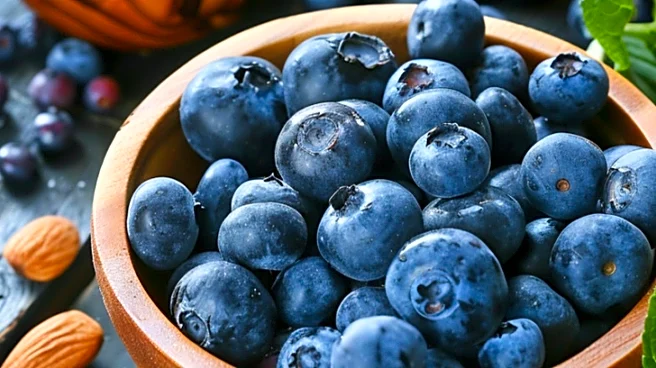What's Happening?
Recent research has identified polyphenols, naturally occurring compounds found in foods like berries, green tea, coffee, and dark chocolate, as having potential geroprotective effects. These compounds may help protect against or slow down biological processes involved in aging. Polyphenols act as antioxidants with anti-inflammatory properties, and their consumption is linked to lower incidences of age-related diseases. The study, published in the Ageing Research Reviews journal, observed high consumption of polyphenol-rich foods in 'blue zones,' regions where people live longer, healthier lives. However, the concept of blue zones has been questioned due to data inconsistencies, such as the absence of birth certificates. Despite this, the study suggests polyphenols can positively impact the aging process, although longevity is influenced by a blend of lifestyle and socio-cultural factors.
Why It's Important?
The significance of polyphenols lies in their potential to improve health and longevity. They may enhance cardiometabolic function, support endothelial health, and have anti-inflammatory effects. Polyphenols also exhibit prebiotic properties, feeding beneficial gut bacteria and offering antimicrobial effects against pathogens. This can lead to improved cardiovascular health, better blood sugar control, and a lower risk of chronic diseases like cancer and Alzheimer's. The findings suggest that incorporating polyphenol-rich foods into diets could contribute to healthier aging, although other factors like genetics, lifestyle, and socio-cultural influences also play crucial roles.
What's Next?
While the study highlights the benefits of polyphenols, it also emphasizes the importance of dietary patterns over supplements. Experts recommend focusing on natural food sources of polyphenols, such as berries, green tea, coffee, and dark chocolate, combined with fiber to support gut health. Consistent intake of polyphenols through a diet rich in fruits, vegetables, nuts, and olive oil is advised. Future research may further explore the exact quantities needed for optimal health benefits and the interplay between polyphenols and other lifestyle factors.
Beyond the Headlines
The discussion around polyphenols also touches on broader dietary habits and the importance of a balanced diet. While polyphenols offer health benefits, they are part of a larger dietary pattern that includes fiber and other nutrients. The Mediterranean diet, naturally rich in polyphenols, is highlighted as a beneficial dietary approach. The study encourages small daily choices that cumulatively enhance health, such as opting for black coffee, snacking on dark chocolate, and consuming mixed berries.










